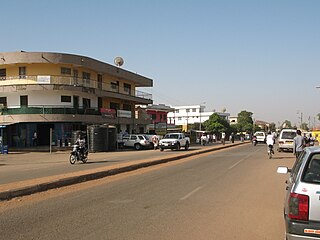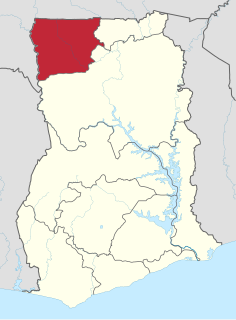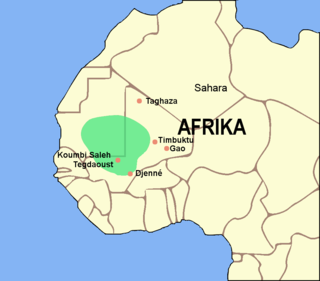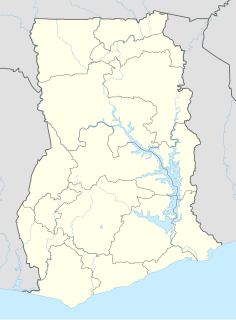The Dagaaba people are an ethnic group located north of the convergence of Ghana, Burkina Faso and Côte d'Ivoire. They speak the Dagaare language, a Gur language made up of the related Northern Dagaare dialects, Southern Dagaare dialects and a number of sub dialects. In northern dialects, both the language and the people are referred to as Dagara. They are related to the Birifor people and the Dagaare Diola. The language is collectively known as Dagaare, and historically some non-natives have taken this as the name of the people. One historian, describing the former usage of "Dagarti" to refer to this community by colonials, writes: "The name 'Dagarti' appears to have been coined by the first Europeans to visit the region, from the vernacular root dagaa. Correctly 'Dagari' is the name of the language, 'Dagaaba' or 'Dagara' that of the people, and 'Dagaw' or 'Dagawie' that of the land."

Ngũgĩ wa Thiong'o is an award-winning, world-renowned Kenyan writer and academic who writes primarily in Gikuyu. His work includes novels, plays, short stories, and essays, ranging from literary and social criticism to children's literature. He is the founder and editor of the Gikuyu-language journal Mũtĩiri.

Wa is a town and is the capital of Wa Municipal District and the Upper West Region of north Ghana. Wa has a 2012 settlement population of 102,446. Features of the town include several mosques, the Wa-Na Palace, a museum and a nearby hippopotamus sanctuary. The geography of Wa is notable for the dramatic monadnock Ombo Mountain which is located around Kaleo and visible from much of the Wa town. Other notable towns around Wa wa region include Naaha and Ga

The Upper West Region of Ghana is located in the north-western corner of Ghana and is bordered by Upper East region to the east, Northern region to the south, and Burkina Faso to the west and north. The Upper West regional capital and largest settlement is Wa. Upper West is the youngest region, created in Ghana by the then Head of State, Flight-Lieutenant Jerry Rawlings in 1983 under the Provisional National Defense Council (PNDC). The area was carved out of the former Upper Region, which is now the Upper East Region.

Southwestern Mandarin, also known as Upper Yangtze Mandarin, is a primary branch of Mandarin Chinese spoken in much of central and southwestern China, including in Sichuan, Yunnan, Chongqing, Guizhou, most parts of Hubei, the northwestern part of Hunan, the northern part of Guangxi, and some southern parts of Shaanxi and Gansu. Some forms of Southwest Mandarin are not entirely mutually intelligible with Standard Chinese or other forms of Mandarin.
The Wala or Waala live in Upper West Region of Ghana. They are a predominantly Muslim people who are the founders of the city of Wa and the Kingdom of Wala. They speak the Wali language, which belongs to the Gur group. There are 84,800 speakers of the language as of 2013. Their neighbors are the Birifor, Dagaaba, and Vagla peoples.
The northwestern fat mouse is a species of rodent in the family Nesomyidae. It is native to tropical West Africa where it occurs on grassland and crop land.
Professor Emeritus Ivor G. Wilks was a noted British Africanist and historian, specializing in Ghana. He was an authority on the Asante Kingdom in Ghana and the Welsh working-class movement in the 19th century. He had one of the most distinguished careers of any historian of Africa, which ended as Professor Emeritus of History at Northwestern University in Illinois, USA.

Annerly was a sternwheel steamboat that operated on the upper Kootenay River in British Columbia and northwestern Montana from 1892 to 1896.

The Ghana Empire, properly known as Wagadou, was a West African empire located in the area of present-day southeastern Mauritania and western Mali. Complex societies based on trans-Saharan trade with salt and gold. had existed in the region since ancient times, but the introduction of the camel to the western Sahara in the 3rd century CE, opened the way to great changes in the area that became the Ghana Empire. By the time of the Muslim conquest of North Africa in the 7th century the camel had changed the ancient, more irregular trade routes into a trade network running from Morocco to the Niger river. The Ghana Empire grew rich from this increased trans-Saharan trade in gold and salt, allowing for larger urban centres to develop. The traffic furthermore encouraged territorial expansion to gain control over the different trade routes.

Builsa South is one of the constituencies represented in the Parliament of Ghana. It elects one Member of Parliament (MP) by the first past the post system of election. Builsa South is located in the Builsa district of the Upper East Region of Ghana.

Funsi is a small town and is the capital of Wa East district, a district in the Upper West Region of north Ghana.
The Kingdom of Wala was a polity in what is today Ghana based around Wa. According to some traditions it had an imam as early as 1317.
The Mandara were an indigenous Australian people of the Pilbara region of Western Australia. They are extinct, having been absorbed into neighboring peoples, and their language is unrecorded.
The Ngarlawongga, or more properly Ngarla, were an indigenous Australian people of the inland Mid West region of Western Australia. They are not to be confused with the Ngarla who live on the coast.

Ghana and North Korea established diplomatic relations in 1964.
The 2018 Ghanaian FA Cup is the 40th edition of the Ghanaian FA Cup, the knockout football competition of Ghana.








